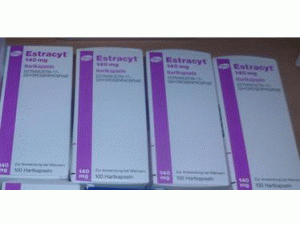艾去适胶囊Estramustine phosphate(Estracyt 140mg Capsules)
 产地国家:德国
产地国家:德国
处方药:是
所属类别: 140毫克/胶囊 100胶囊/盒
包装规格: 140毫克/胶囊 100胶囊/盒
计价单位:盒
生产厂家英文名:Pfizer
原产地英文商品名:ESTRACYT 140mg/Capsules 100Capsules/box
原产地英文药品名:Estramustine phosphate
中文参考商品译名:艾去适 140毫克/胶囊 100胶囊/盒
中文参考药品译名:磷酸雌莫司汀
简介:
部份艾去适中文处方资料(仅供参考)
通用名:磷酸雌莫司汀胶囊
商品名:艾去适
英文名:ESTRACYT(Estramustine phosphate Capsules)
成份:磷酸雌莫司汀
适应症:晚期前列腺癌,尤其是激素难治性前列腺癌;对于预后因素显示对单纯激素疗法疗效差的患者,可作为一线治疗。
用法用量
本品应在有使用抗肿瘤药物经验的医生指导下给药。剂量范围为每日每公斤体重7-14mg(4-8粒胶囊),分2或3次服用。建议初始剂量为至少每公斤体重10mg,4-6粒胶囊。应至少在餐前一小时或餐后二小时以一杯水吞服。牛奶、奶制品及含钙、镁、铝的药物(例如抗酸剂)不能与本品同时服用。若在给药后4-6周观察无效,应撤药。
不良反应
最常见的不良反应包括男子女性化乳房和阳痿、恶心/呕吐、体液潴留/水肿。最为严重的不良反应包括:血栓栓塞、缺血性心脏病和充血性心衰,罕见的为血管神经性水肿。
报道的不良反应按MedDRA系统器官分类如下:血液和淋巴系统异常:贫血、白细胞减少和血小板减少罕见免疫系统异常:超敏反应代谢和营养异常:体液潴留精神异常:意识混乱和抑郁罕见神经系统异常:头痛和昏睡罕见心脏异常:充血性心力衰竭、缺血性心脏病、心肌梗塞血管异常:高血压、血栓栓塞胃肠道异常:恶心和呕吐、腹泻(尤其在治疗的最初2周)肝胆异常:肝功能受损皮肤和皮下组织异常:过敏性皮疹血管神经性水肿(Quincke水肿,喉部水肿)罕见。在多数报道的事件中,包括一例致死性的,患者同时服用了ACE抑制剂。如本品治疗时出现血管神经性水肿,应立即停药。肌肉骨骼和结缔组织异常:肌肉无力罕见生殖系统和乳房异常:男子女性化乳房、阳痿曾有报道罕见的血中转氨酶和胆红素水平一过性升高。
禁忌
磷酸雌莫司汀胶囊不能用于下列患者:已知对雌二醇或氮芥类药物过敏既往严重的白细胞减少和/或血小板减少严重的肝脏疾病严重的心血管疾病:缺血性、血栓栓塞性或体液潴留引发的并发症
注意事项
磷酸雌莫司汀胶囊应慎用于具有血栓性静脉炎、血栓形成或血栓栓塞病史的患者,尤其是与雌激素治疗相关时。也应慎用于有脑血管及冠状动脉疾病的患者。糖耐量-由于糖耐量可能降低,当接受本品治疗时,糖尿病患者应仔细监测。血压上升-由于可能出现高血压,应定期测量血压。
体液潴留-接受本品治疗的患者有报道出现已存在的或初发的周围性水肿加剧,充血性心脏疾病加剧;体液潴留还可能影响一些其他症状,如癫痫、偏头痛或肾功能不全,因此需要仔细观察。钙/磷代谢一因为本品可能影响钙和磷代谢,故与高钙血症有关的骨代谢疾病患者应慎用,肾功能不全的患者也应慎用。前列腺癌及成骨性骨转移的患者有低钙血症的风险,应密切监测钙水平。当患者有肝功能损害时,本品可能代谢不良,应慎用于此类患者。并应定期检查患者的肝功能。
注意
由于含雌激素的药物可影响相关的内分泌系统及肝功能,所以相应的实验室检查值也会受影响。免疫抑制效应/感染易感性增加-对于接受化疗药物包括雌莫司汀而导致免疫妥协的患者,接种活疫苗或者减毒活疫苗可能会产生严重或致命的感染。
正在接受雌莫司汀治疗的患者应该避免接种活疫苗。可以接种死疫苗或者灭活疫苗,但是对这些疫苗的免疫应答可能会降低。与大多数抗肿瘤免疫抑制剂相同,本品在动物中和特定实验条件下显示有致癌性。此外,即使Ames实验未显示磷酸雌莫司汀有任何致突变作用,但已发现雌二醇及氮芥均能致突变。
应定期进行全血细胞计数及肝功能检查。对驾驶和操作机器的能力的影响尚未就雌莫司汀对患者操作机器和驾驶能力的影响进行系统评估。
禁忌:胶囊:当存在钙、镁或铝盐时,磷酸雌莫司汀会产生沉淀。
包装规格:100粒x140mg
英文版说明书:
Estracyt Capsules1. Name of the medicinal productEstracyt Capsules.2. Qualitative and quantitative compositionEstramustine phosphate 140 mg as estramustine sodium phosphate.3. Pharmaceutical formWhite, hard, gelatin capsules.4. Clinical particulars4.1 Therapeutic indicationsCarcinoma of the prostate, especially in cases unresponsive to, or relapsing after, treatment by conventional oestrogens (stilboestrol, polyoestradiol phosphate etc.) or by orchidectomy.4.2 Posology and method of administrationAdult and the elderlyDosage range may be from 1 to 10 capsules a day by mouth. The capsules should be taken not less than 1 hour before or 2 hours after meals. Milk, milk products or drugs containing calcium, magnesium or aluminium (e.g. antacids) must not be taken simultaneously with Estracyt capsules (see section 4.5). Standard starting dosage is 4-6 capsules a day in divided doses with later adjustment according to response and gastrointestinal tolerance.ChildrenEstracyt should not be administered to children.4.3 ContraindicationsUse in patients with peptic ulceration, or those with severe liver dysfunction or myocardial insufficiency.Use in patients with active thrombosis or thromboembolic disorders or complications related to fluid retention.Use in children.Use in patients hypersensitive to oestradiol or nitrogen mustard.4.4 Special warnings and precautions for useEstramustine should be used with caution in patients with a history of thrombophelebitis, thrombosis or thromboembolic disorders, especially if associated with estrogen therapy. Caution should also be used in patients with cardiovascular disease, cerebral vascular disease and coronary artery disease.Glucose Tolerance – Because glucose tolerance may be decreased, diabetic patients should be carefully followed while receiving estramustine.Elevated blood pressure – Because hypertension may occur, blood pressure should be monitored periodically.Fluid retention – Exacerbation of pre-existing or incipient peripheral oedema or congestive heart disease has been seen in some patients receiving estramustine therapy. Other conditions which might be influenced by fluid retention, such as epilepsy, migraine, or renal dysfunction, require careful observation.Calcium/phosphorous metabolism – Estramustine may influence the metabolism of calcium and phosphorous and should be used with caution in patients with metabolic bone diseases that are associated with hypercalcemia or in patients with renal insufficiency. Serum calcium should be performed at regular intervals. Patients with prostate cancer and osteoblastic metastases are at risk for hypocalcemia and should have calcium levels closely monitored.Estramustine may be poorly metabolized in patients with impaired liver function and should be administered with caution in such patients. Liver function tests should be performed at regular intervals.Note: since certain endocrine and hepatic functions are influenced by estrogen-containing drugs the corresponding laboratory test values will be affected.Use with caution in patients with moderate to severe bone marrow depression. Blood count should be performed at regular intervals.Immunosuppressant Effects/Increased Susceptibility to Infections - Administration of live or live-attenuated vaccines in patients immunocompromised by chemotherapeutic agents including estramustine, may result in serious or fatal infections. Vaccination with a live vaccine should be avoided in patients receiving estramustine. Killed or inactivated vaccines may be administered; however, the response to such vaccines may be diminished4.5 Interaction with other medicinal products and other forms of interactionOestrogens have been reported to increase both therapeutic activity and toxicity of tricyclic antidepressants, probably via inhibition of their metabolism.Milk, milk products or drugs containing calcium, magnesium or aluminium may impair the absorption of Estracyt and simultaneous intake must therefore be avoided. The mechanism behind this interaction is that estramustine forms insoluble salts with polyvalent metal ions.An interaction between Estracyt and ACE-inhibitors, possibly leading to an increased risk of angioneurotic oedema cannot be excluded.4.6 Pregnancy and lactationEstradiol and nitrogen mustard are potentially mutagenic, and therefore males undergoing treatment with estramustine should employ contraceptive measures (See section 5.3).Since Estracyt is indicated for carcinoma of the prostate in males, it is not indicated for women.4.7 Effects on ability to drive and use machinesThe effect of estramustine on the ability to drive or use machinery has not been systematically eva luated.4.8 Undesirable effectsThe most common adverse reactions include gynaecomastia and impotence, nausea/vomiting and fluid retention/oedema.The most serious reactions are thromboembolism, ischaemic heart disease, congestive heart failure and, rarely and angioneurotic oedema.Reported reactions arranged according to MedDRA System Organ System are the following:Blood and lymphatic system disorders: Anemia, leukopenia, thrombocytopenia rarely occur.Immune system disorders: Hypersensitivity reactionMetabolism and nutrition disorders: Fluid retentionPsychiatric disorders: Confusion and depression rarely occur.Nervous system disorders: Headache and lethargy rarely occurCardiac disorders: Congestive heart failure, ischemic heart disease, myocardial infarctionVascular disorders: Hypertension, thromboembolismGastrointestinal disorders: Nausea and vomiting, diarrhea (particularly during the first two weeks of treatment)Hepato-biliary disorders: Impairment of liver functionSkin and subcutaneous tissue disorders: Allergic skin rash.Angioneurotic edema (Quincke edema, larynx edema) can rarely occur. In many reported cases, including a fatal one, patients were concomitantly receiving ACE-inhibitors. Therapy with Estracyt is to be immediately discontinued should angioneurotic edema occur.Musculoskeletal and connective tissue disorders: Muscular weakness rarely occurs.Reproductive system and breast disorders: Gynecomastia, impotence4.9 OverdoseThere is no specific antidote. Treatment is symptomatic and supportive (as necessary the gastric contents should be evacuated by gastric lavage) and in the event of dangerously low red cell, white cell or platelet count, whole blood should be given as necessary. Liver function should be monitored.5. Pharmacological properties5.1 Pharmacodynamic propertiesATC Code: L01XX11Estracyt is a chemical compound of oestradiol and nitrogen mustard. It is effective in the treatment of advanced prostatic carcinoma.Estracyt has a dual mode of action. The intact molecule acts as an anti-miotic agent; after hydrolysis of the carbamate ester, the metabolites act to bridge the released oestrogens and exert an anti-gonadotrophic effect. The low level of clinical side effects may be due to the fact that estramustine binds to a protein present in the tumour tissue, so resulting in accumulation of the drug at the target site. Estracyt also has weak oestrogenic and anti-gonadotrophic properties.Estracyt causes little or no bone marrow depression at usual therapeutic dosage. Estracyt is effective in patients who have not previously received drug therapy, as well as in those who have shown no response to conventional hormone treatment.5.2 Pharmacokinetic propertiesEstramustine phosphate sodium is rapidly dephosphorylated in the intestine and prostate to estramustine and estromustine, which accumulate in the prostatic tissue. The plasma half-lives of these metabolites are 10 - 20 hours. Estramustine and estromustine are further metabolised before excretion.5.3 Preclinical safety dataIn repeat dose toxicity studies in rats, dogs and monkeys the main target organs are the hemolymphopoietic and endocrine systems and male and female reproductive organs, with changes related to both oestrogenic and cytotoxic effects of estramustine phosphate.No reproduction or oncogenicity studies have been undertaken and the mutagenicity of the compound has not fully been investigated. Nevertheless estramustine phosphate, like other oestrogenic and antimitotic agents, must be considered toxic to the reproductive organs and potentially mutagenic and carcinogenic.6. Pharmaceutical particulars6.1 List of excipientsTalcum, sodium lauryl sulphate, colloidal silicon dioxide, magnesium stearate, titanium dioxide (E171), hard gelatin capsule, black ink (containing black iron oxide (E172), ammonium hydroxide (E527), propylene glycol (E1520) and shellac).6.2 IncompatibilitiesNone that are relevant.6.3 Shelf life60 months in brown glass bottles.6.4 Special precautions for storageStore out of the sight and reach of children.The product is stable at storage conditions of 25°C + 2°C/60%RH (long term) and 40°C + 2°C/75%RH (short term). Therefore the product does not require any special storage precautions within EU countries (Climactic zone 2).6.5 Nature and contents of containerBrown glass bottle containing 100 capsules.6.6 Special precautions for disposal and other handlingNo special instructions.7. Marketing authorisation holderPfizer LimitedRamsgate Road, Sandwich, KentCT13 9NJUK8. Marketing authorisation number(s)PL 00057/09739. Date of first authorisation/renewal of the authorisation25 May 2002/13 Nov 200810. Date of revision of the text07/2013
药品价格查询,专业药品查询网站,药品说明书查询,药品比价 » 艾去适胶囊Estramustine phosphate(Estracyt 140mg Capsules)



